Early Life:
Rev. Jerome D’Souza was born on 6 August 1897 in Mangalore. He received a degree in English literature at the University of Madras. Subsequently, he taught for a while at St. Joseph’s College in Tiruchirappalli before deciding to enter the Society of Jesus on 29 May 1921. He was ordained as a priest in Belgium in 1931. Soon after, D’Souza was appointed as the Principal of his alma mater, St. Joseph’s College, Tiruchirappalli. During this time, he came in contact with nationalist leaders like Nehru and C. Rajagopalachari.
In April 1938 he was named a Rector – the first Indian to achieve this feat. In 1942, he was transferred to Loyola College in Chennai and appointed as the Rector and Principal.
Role in India’s Independence Movement:
D’Souza was not directly involved with the freedom movement.
During D’Souza’s tenure at Loyola College, he was appointed to the War Reconstruction Committee to plan post-war education schemes.
Impressed by his work on education and his oratory skills, C. Rajagopalachari proposed his name to the Madras Legislative Assembly.
Contribution to Constitution Making:
D’Souza was elected to the Constituent Assembly in 1946 from the Madras Presidency. He made important interventions on various topics including language, minority rights and reservation.
Later Contributions:
D’Souza had command over multiple languages such as French, Spanish, English and Dutch, which came in handy when he led diplomatic negotiations on behalf of the Nehru Government .
In 1949, D’Souza was nominated by Nehru to be a part of the Indian Delegation to the General Assembly of the United Nations – he participated in four sessions.
He was involved in negotiations with the Vatican Church on control over churches in India. D’Souza also negotiated with the French government on the peaceful transfer of French colonies to independent India.
In continuation of his work on education, in 1951 he established Xavier Board of Higher Education in India. D’Souza also established the Indian Social Institute.
D’Souza passed away on 12 August 1977. The Government of India honoured him on his birth centenary by issuing a postal stamp in his name in 1997.
Key Writings:
- D’Souza supported the Munshi-Ayyanger formula on the official language issue. He advocated for Hindi as the official language since he wanted a universal language to be adopted in India and Hindi was a suitable compromise. He believed Hindi could evolve to become the national language in the years to come.
- He believed that if the fundamental rights guaranteed under the Constitution are enforced, there would be no need for separate minority rights as the minority interests are safeguarded in the fundamental rights provisions.
- When discussing reservation in elections for minorities, he opposed the proposition to have reservation of seats for religious minorities. He trusted that the majority community would be responsible in upholding the principles of democracy.
- A Great Indian Jesuit, Fr. Jerome D’Souza 1897-1977: Priest, Educationist, and Statesman by V. Lawrence Sundaram (1986)
- Speeches and Writings of Rev. Fr. Jerome D’Souza by Jerome D’Souza (1972)

